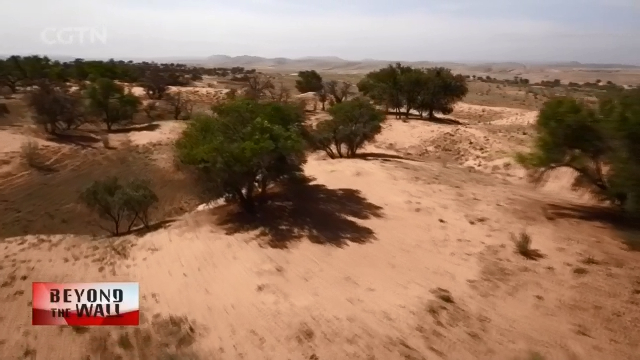
13:27, 16-Sep-2018
Holding Back the Desert: China builds green walls to stop sand advancement
Updated
13:00, 19-Sep-2018
05:29

Desertification is killing off natural resources and driving people from their homes. China has set the goal of reclaiming 100-thousand square kilometers of land by 2020. In today's special series Beyond the Wall, CGTN's Han Bin goes to a village in North China's Gansu province, to see how it's being done. And how a new concept of nature may help the country to win a most challenging battle in the long run.
"The sand is drifting south ten meters a year towards the village of Babusha. If we don't fight against the desert, we have to retreat from our homeland. No matter how tough it is, we must try our best to defend our land."
This is Babusha, in the south of the Taklimakan, China's fourth largest desert. 30 years ago, the desert was all you could see. Now a green wall is helping hold back the sand.
GUO WANGANG, HEAD BABUSHA FOREST FARM, GANSU "How many years did it take for this tree to grow? Forty. We've achieved gaining land from sand."
66-year-old Guo Wanggang is a guardian of Babusha's forest farm. He's a second generation desert fighter, following in his father's footsteps. He wants to build the world's longest artificial forest on sand.
"This is a drought-resistant plant, the hairy thistle. If sand dune can be fixed, it will grow naturally. This place used to be a barren desert, but now everywhere is full of greenery. All kinds of herbs, shrubs, and trees are forming a wide belt of windbreaks. Over there lie the Qilian Mountains and the Ming Great Wall in front. Had my father's generation done nothing, the sand would have kept advancing north. The Qilian Mountains would have been turned into a sea of sand."
Desertification is a result of deforestation, over-use of land, and climate change. It's one of the most severe challenges facing China. The government has encouraged farmers to plant more trees. This strategy is workable, at least, here at Babusha.
"This is the well for the whole village. Villagers depend on it for water supply. If we can't defy the desert, the village will soon be covered by sand. The village is right below the sand dune. Here's the dividing line. Now the sand is under our control. But it will continue to drift, and we should never stop efforts. Only when the sand stops to move on can we still live in this village."
One hundred families now live in Babusha. Most have decided to stay. We visit Liu Licai's family. They recalled the worst days.
"Do you want to stay in the village?"
"Yes."
"How bad was the sandstorm?"
"Sand was everywhere. We didn't want to go anywhere."
"When sandstorms occurred, you could hardly see any people in front of you."
Taking on the desert has secured their lives in Babusha. They do not have to become ecological refugees.
"In the past, even indoors, you could feel the wind. It was impossible to eat in the yard. After decades of fighting against the sand, the farmland is being protected to grow crops. This year's corn harvest is over 50 kilos per hectare."
Babusha's story is a microcosm of China's lengthy war against desertification. Guo Wangang says combating the desert does not mean eradicating it. It's a new concept in land management.
"We use checkerboards to anchor the sand. It's an artificial boost with natural restoration. First, we cut a ditch 20 centimeters wide and put grass on top of the ditch. Then, we cut the grass and put sand on it. Sand can actually keep water deep down. You put some grass seed in the grids, and plant a tree in the middle of the grid. This is how we hold back the sand and achieve greenery."
HAN BIN BABUSHA VILLAGE "Desertification is the most severe environmental threat facing China. If no action is taken, the sand area will expand. So farmers here are changing the situation, step by step. Today, they are looking for ways to coexist with this harsh side of nature."
GUO WANGANG, HEAD BABUSHA FOREST FARM, GANSU "Deserts aren't scary for humans. They have always been a natural landscape co-existing with humans. Our dream for the future is to try our best to further reduce the scale of desert and sandstorms, and reduce their harm to humans."
Han Bin, CGTN, from Babusha village in Gansu Province.

SITEMAP
Copyright © 2018 CGTN. Beijing ICP prepared NO.16065310-3
Copyright © 2018 CGTN. Beijing ICP prepared NO.16065310-3